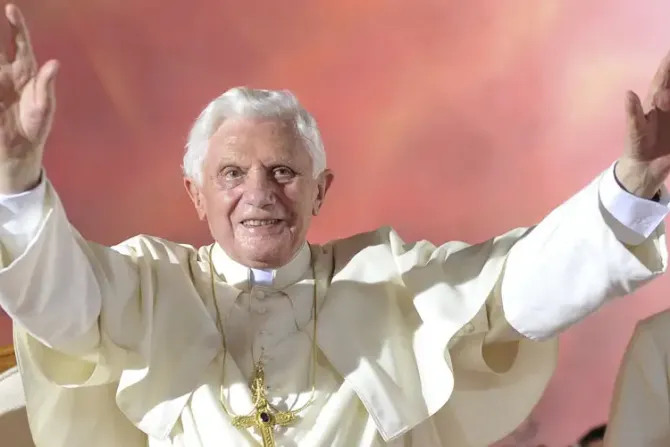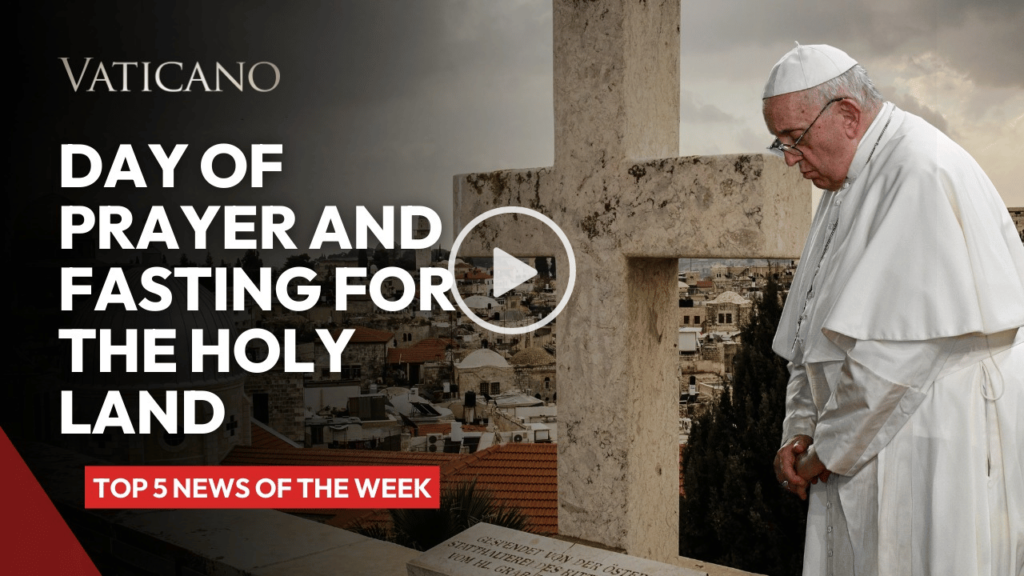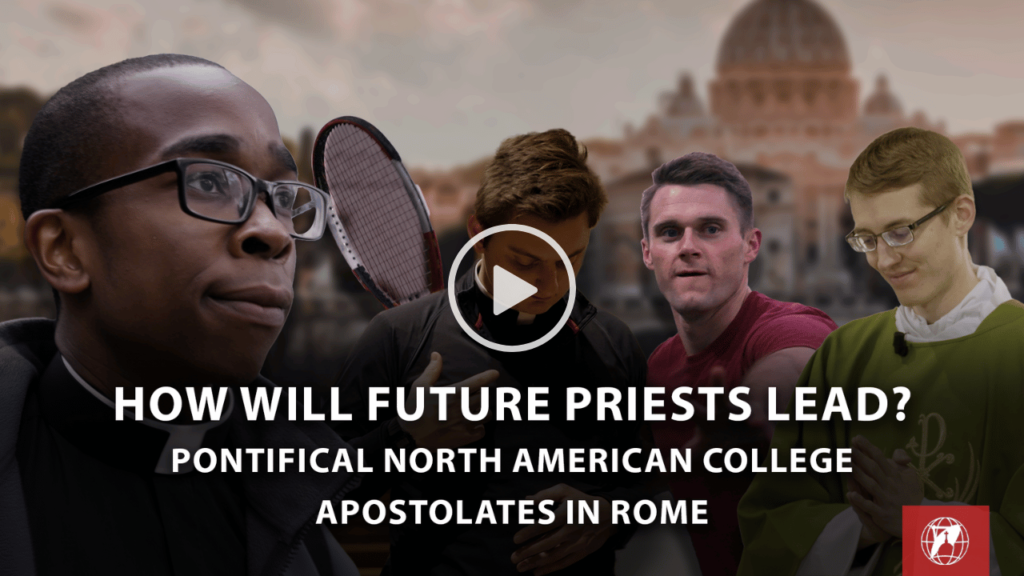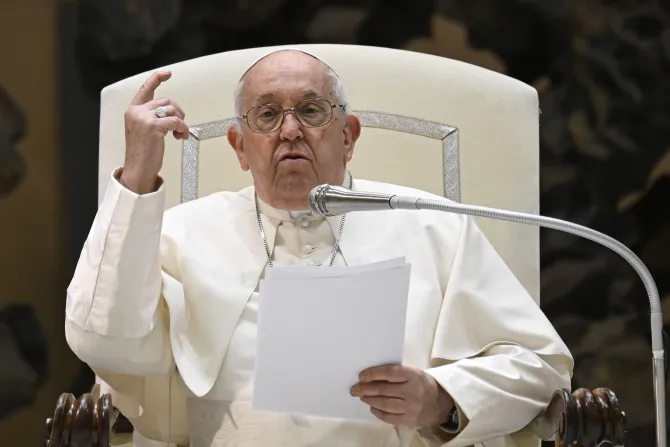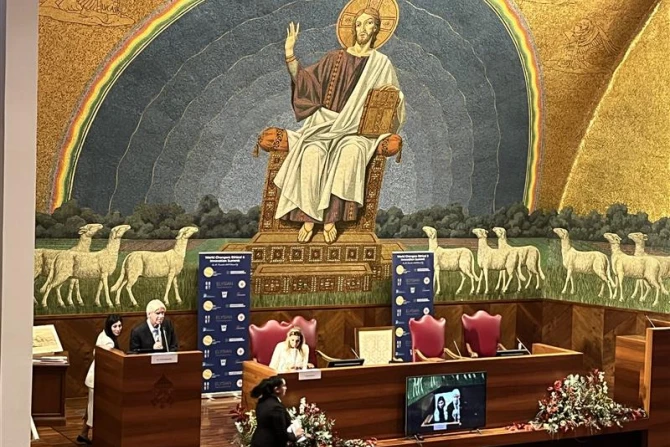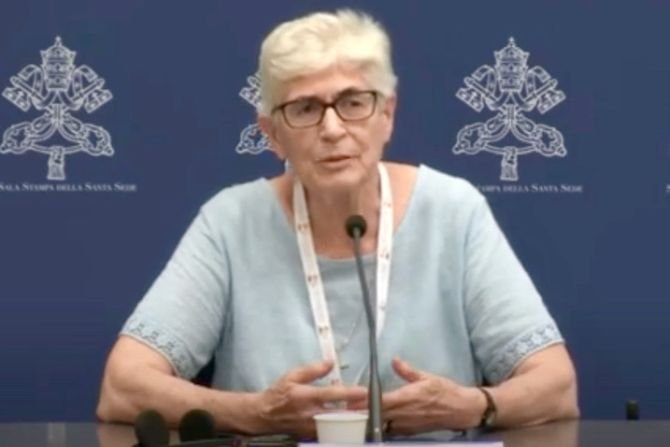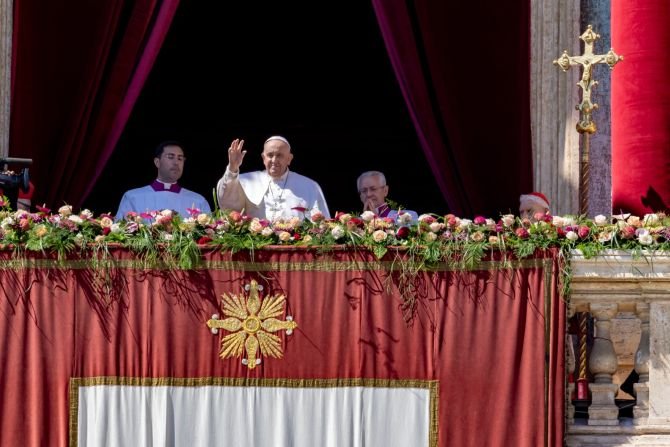The Vatican will publish the previously uncirculated “private” homilies of the late Pope Benedict XVI in the coming year, the Holy See has announced.
The Vatican Publishing House said Dec. 23 that it intends to release “a book of some 130 homilies given by the late Pope Benedict XVI at private Sunday Masses,” according to Catholic News Service (CNS).
The homilies comprise “30 given while [Benedict] was pope and more than 100 given to members of his household once he retired,” CNS reported.
The homilies were reportedly transcribed by members of Memores Domini, a lay association that lived with Benedict, the news service said. Four female members of the organization worked in Benedict XVI’s papal household and also moved with him to the Mater Ecclesiae Monastery after his retirement.
Neither the Vatican nor the Joseph Ratzinger-Benedict XVI Vatican Foundation, who also announced the publication of the homilies last week, gave a date for when the writings would be fully published.
The Vatican City newspaper L’Osservatore Romano and the German newspaper Die Welt published the first of the homilies earlier this month.
That homily was a meditation on St. Joseph, according to CNS. In it, Pope Benedict observed that “the danger is that if the word of God is essentially law, it can be regarded as a sum of prescriptions and prohibitions, a package of norms, and the attitude, therefore, would be to observe the norms and thus be correct.”
“But if religion is like that, if that is all it is, there is no personal relationship with God, and man remains within himself, seeks to perfect himself, to be perfect,” the late pope said, observing that it is difficult to love a God “who presents himself only with rules and sometimes even threats.”
Christians, Benedict noted, face “the same temptation, the same danger that existed in the Old Testament: even a Christian can arrive at an attitude in which the Christian religion is regarded as a package of rules, of prohibitions and positive norms.”
The late pope passed away on Dec. 31, 2022, having retired in 2013. He was the first pope to voluntarily resign since Celestine V in 1294.
Last year, Ignatius Press published the book “The Divine Project: Reflections on Creation and Church,” which collected six lectures of Benedict XVI that had been recorded on audio cassettes but then misplaced for 30 years and forgotten.
Benedict, then Cardinal Joseph Ratzinger, delivered that series of lectures in 1985.
Below is the unpublished homily of Pope Benedict XVI translated into English from Italian.
Homily of Benedict XVI from 22-12-2013 – IV Sunday of Advent
Private Chapel – Mater Ecclesiae Monastery
Gospel: Mt 1:18-24
Dear Friends,
alongside Mary, Mother of the Lord, and Saint John the Baptist, today the liturgy presents us with a third figure, in whom Advent is almost a person, a figure who embodies Advent: Saint Joseph. Meditating on the text of the Gospel we can see, it seems to me, three foundational elements of this vision.
The first and decisive is that Saint Joseph is called “a righteous man.” For the Old Testament, this is the maximum characterization of someone who truly lives according to the word of God, who lives the covenant with God.
To understand this well we must think about the difference between the Old and New Testaments.
The fundamental act of a Christian is the encounter with Jesus, in Jesus with the word of God, who is a Person. Encountering Jesus we encounter the truth, the love of God, and thus our friendship becomes love, our communion with God grows, we are truly believers, and we become saints.
The fundamental act in the Old Testament is different, because Christ was still to come and therefore at most it was tending towards the encounter with Christ, but it was not yet a true encounter as such. The word of God in the Old Testament is essentially in the form of the law—”Torah.” God leading, this is the meaning, God showing us the way. It is a path of education that forms man according to God and makes him capable of encountering Christ. In this sense this righteousness, this living according to the law is a path towards Christ, a reaching out towards Him; but the fundamental act is the observance of the Torah, of the law, and thus being “righteous.”
Saint Joseph is a righteous man, an exemplary anchor of the Old Testament.
But here there is a danger and at the same time a promise, an open door.
The danger appears in Jesus’ discussions with the Pharisees and especially in the letters of Saint Paul. The danger is that if the word of God is substantially law, it should be considered as a sum of prescriptions and prohibitions, a package of rules, and the attitude should therefore be to observe the rules and in this way to be correct. But if religion is like this, is only this, a personal relationship with God does not arise and man remains within himself, seeking to perfect himself, to be perfect. But like this a bitterness is born, as we see in the second son of the parable of the prodigal son, who, having observed everything, in the end is bitter and even a little envious of his brother who, as he thinks, has lived life in abundance. This is the danger: the sole observance of the law becomes impersonal, just doing, man becomes hardened and even bitter. In the end he cannot love this God, who only presents himself with rules and sometimes even with threats. This is the danger.
The promise instead is: we can also see these prescriptions, not only as a code, a package of rules, but as an expression of God’s will, in which God is speaking to me, I am speaking to Him. By entering into this law, I enter into dialogue with God, I learn the face of God, I begin to see God, and thus I am on the path towards the word of God in person, towards Christ. And a truly righteous man like Saint Joseph is like this: for him the law is not simply the observance of rules, but it presents itself as a word of love, an invitation to dialogue, and life according to the word is to enter into this dialogue and to discover the love of God behind and within the rules, understanding that all these rules are not valid in themselves, but they are rules of love, they serve so that love might grow in me. Thus we understand that finally the entirety of the law is simply love of God and neighbor. Discovering this, the entire law is observed. If one lives in this dialogue with God, a dialogue of love in which he seeks the face of God, in which he seeks love and makes it clear that everything is dictated by love, he is on the path towards Christ, he is truly righteous. Saint Joseph is truly a righteous man, so in him the Old Testament becomes New, because in the words he seeks God, the person, he seeks His love, and all its observance is life in love.
We see this in the example that this Gospel offers us. Saint Joseph, engaged to Mary, finds that she is expecting a child. We can imagine his disillusionment: he knew this girl and the depth of her relationship with God, her inner beauty, the extraordinary purity of her heart; he saw the love of God and the love of His word, of His truth, shining through in this girl and now he finds himself gravely disillusioned. What is he to do? Here, the law offers two possibilities, in which the two paths appear, the dangerous, fatal one, and the one of promise. He can sue her in court and thus expose Mary to shame, destroying her as a person. He can do it privately with a letter of separation. And Saint Joseph, a truly righteous man, even though he suffered greatly, comes to the decision to take this path, which is a path of love in righteousness, of righteousness in love, and Saint Matthew tells us that he fought with himself, within himself with the word. In this struggle, in this journey to understand the true will of God, he found the unity between love and rule, between righteousness and love, and so, on his way towards Jesus, he is open for the apparition of the angel, open for the moment in which God gives him the knowledge that this is a work of the Holy Spirit.
St. Hilary of Poitier, in the 4th century, once, treating the fear of God, said in the end: “For us the fear of God consists wholly in love,” it is only one aspect, a nuance of love. Thus we can say here for ourselves: the law is wholly placed in love, it is an expression of love and must be fulfilled by entering into the logic of love. And here we must keep in mind that, even for us Christians, there exists the same temptation, the same danger that existed in the Old Testament: even a Christian can arrive at an attitude in which the Christian religion is considered as a package of rules, of prohibitions and of positive rules, of prescriptions. We can arrive at the idea that it is only a matter of carrying out impersonal prescriptions and thus perfecting oneself, but in this way we empty the personal foundation of the word of God and we arrive at a certain bitterness and hardness of the heart. In the history of the Church we see this in Jansenism. We, too, all know this danger, even personally we know that we must always overcome this danger again and again and find the Person and, in the love of the Person, the path of life and the joy of faith. Being righteous means finding this path, and in this way in reality we too are always on the journey from the Old to the New Testament in search of the Person, of the face of God in Christ. This is precisely what Advent is: emerging from the pure rule towards the encounter of love, emerging from the Old Testament, that it might become New.
This therefore is the first and fundamental element of the figure of Saint Joseph as he appears in today’s Gospel. Now two very brief words on the second and third elements.
The second: he sees the angel in the dream and listens to his message. This presupposes an interior sensitivity for God, a capacity to perceive the voice of God, a gift of discernment, which knows how to discern between dreams that are dreams and [those that are] a true encounter with God. Only because Saint Joseph was already on his way towards the Person of the Word, towards the Lord, towards the Savior, could he discern; God could speak to him and he understood: this is not a dream, it is truth, it is the apparition of His angel. And so he could discern and decide.
This sensitivity towards God is important for us too, this ability to perceive that God is speaking to me, and this ability to discern. Of course, God does not normally speak to us as he spoke through the angel to Joseph, but he has his own modes of speaking to us as well. They are gestures of God’s tenderness, which we must perceive in order to find joy and consolation, they are words of invitation, of love, even of request in our encounter with people who suffer, who need a word or a concrete gesture from me, a deed. Here we need to be sensitive, know the voice of God, understand that God is now speaking to me, and respond.
And so we have arrived at the third point: Saint Joseph’s response to the angel’s word is faith and then obedience, deed. Faith: he understood that this was really the voice of God, it was not a dream. Faith becomes a foundation on which to act, on which to live, it means recognizing that this is the voice of God, an imperative of love, which guides me on the path of life, and then doing the will of God. Saint Joseph was not a dreamer, even if the dream was the door with which God entered his life. He was a practical and sober man, a man of decision, capable of organizing. It was not easy—I think—since there was no room in the inn, to find in Bethlehem the stable as a discreet and protected place and, despite the poverty, worthy for the birth of the Savior. Organizing the flight into Egypt, finding somewhere to sleep every day, to live for a long time: this required a practical man with a sense of action, with the ability to respond to challenges, to find the possibilities of survival. And then upon their return, the decision to return to Nazareth, to establish the homeland of the Son of God here, this also shows that he was a practical man, who as a carpenter lived and made everyday life possible.
Thus Saint Joseph invites us on the one hand to this interior journey in the word of God, to be ever closer to the Lord as person, but at the same time he invites us to a sober life, to work, to daily service in order to do our duty in the great mosaic of history. Let us thank God for the beautiful figure of Saint Joseph. Let us pray: “Lord, help us to be open to You, to increasingly find Your face, to love You, to find love in the rule, to be rooted, fulfilled in love. Open us to the gift of discernment, to the ability to listen to you and to the sobriety of living according to your will and in our vocation.” Amen!
Adapted by Jacob Stein

